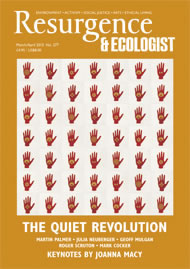“If you want to be happy, be” was Tolstoy’s simple advice. But it seems that we’re forgetting how to be, and how to be happy.
If happiness is proving elusive in the modern age, it’s understandable. Higher systems of meaning have withered. Life purpose has dwindled to feeling good. We live on cultural soil ideally suited for depression. Moreover, today’s culture invites many happiness blockers – stress, materialism, discontent, complication, hyper-competition, rage, boredom, loneliness and identity confusion. We’re honed to be removed from Nature, married to work, adrift from family and friends, spiritually alienated, sleep-deprived, physically unfit and enslaved to debt.
The highest forms of happiness have always been experienced and expressed as love. Yet a society’s dominant value system dictates how happiness is measured. For example, the Navajos gauged happiness in terms of the attainment of universal beauty. Their counterpart of “Have a nice day” was “May you walk in beauty.”
By contrast, the most common way of measuring happiness today is in terms of ‘personal satisfaction’. This mirrors the supreme value that the consumer culture attaches to the romancing of desire and the satiation of the self. But as artist Salvador Dali knew, total satisfaction can actually be a major obstacle to happiness: “There are days when I think I’m going to die from an overdose of satisfaction.”
To preserve the ‘rarity value’ of life’s gifts, one must resist wrapping heaven around oneself. Keeping paradise at a distance, yet within reach, is a much better way of staying alive. People who ‘have it all’ must learn the art of flirting with deprivation.
One of the ‘Happiness Keys’ that I incorporate into my book is an exquisite line by philosopher Friedrich Nietzsche: “Precisely the least, the softest, lightest, a lizard’s rustling, a breath, a moment – a little makes the way of the best happiness.” Paradoxically, happiness is closer when we kneel than when we soar.
Happiness is life’s greatest paradox. I never knew how measly my own happiness was until one day in 1978 when I found myself stranded in a remote western Tanzanian village. And so it didn’t surprise me that an African nation, namely Nigeria, was found recently to be the world’s ‘happiest country’.
The study of ‘happy societies’ is awakening us to the importance of social connectedness, spiritual depth, simplicity, modesty of expectations, gratitude, patience, touch, music, movement, play, ‘down time’ and a certain amount of doing without. We are encouraged to hitch our emotional wagons to ego, ambition, personal power, excess and the spectacular. But all of these are surprising flops when it comes to happiness.
Some visionaries now tell us that the only happiness that makes sense at this perilous juncture in Earth’s history is ‘sustainable happiness’, which harks back to the classical Greek philosophies in viewing ethical living as a legitimate vehicle for human happiness. Compassion in particular plays a central role. In part, it rests on the truth that we can be happy in planting the seeds of happiness, even if we might miss the harvest.
The greatest irony of today’s blitz on personal happiness is that genuine happiness is never strictly personal. For happiness to be mature and heart-felt, it must be shared, whether by those around us or by tomorrow’s children. If not, happiness can be downright depressing.







